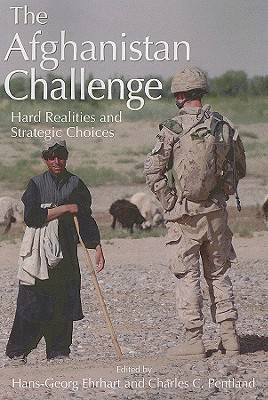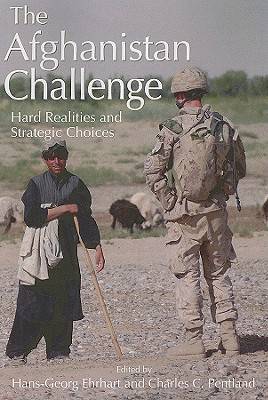
- Afhalen na 1 uur in een winkel met voorraad
- Gratis thuislevering in België vanaf € 30
- Ruim aanbod met 7 miljoen producten
- Afhalen na 1 uur in een winkel met voorraad
- Gratis thuislevering in België vanaf € 30
- Ruim aanbod met 7 miljoen producten
Zoeken
The Afghanistan Challenge
Hard Realities and Strategic Choicesvolume 125
Hans-Georg Ehrhart, Charles Pentland
€ 62,45
+ 124 punten
Omschrijving
Canada and Germany are among the largest contributors to the international mission in Afghanistan, with troops in different parts of the country, fulfilling different roles. Canada's higher ratio of combat to development work is reflected in a higher rate of casualties. Canadians have sometimes joined in criticisms of Germany and other European allies for their unwillingness to take on riskier military tasks in Afghanistan's southern and eastern provinces. Some Germans, in turn, have chided Canada for stressing war - fighting at the expense of approaches more centred on development. This Canadian-German dialogue reflects a larger debate, both operational and existential, within NATO concerning Afghanistan and the future of the alliance. This collection of essays by leading German and Canadian experts assesses the present state and future prospects of the Afghanistan mission, both to advance the dialogue and to suggest better approaches to the policy questions that continue to confront the alliance. Contributors include Michael Brzoska (Institute for Peace Research and Security Policy), Mike Capstick (Canadian Forces ret., University of Calgary), Mihai Carp (NATO), Andrea Charron (Royal Military College), Rainer Glassner (University of Duisburg-Essen), David Haglund (Queen's University), Roland Kaestner (Leadership Academy of the German Armed Forces), Florian Kühn (Helmut Schmidt University of the German Armed Forces), Janet Kursawe (German Institute of Global and Area Studies), David Law (Centre for Democratic Control of Armed Forces, Geneva), Citha Maass (German Institute for International and Security Affairs), Kim Nossal (Queen's University), Lara Olsen (University of Calgary), Conrad Schetter (University of Bonn), Christian Reuter (Der Stern), and Christian Wagner (German Institute for International and Security Affairs).
Specificaties
Betrokkenen
- Auteur(s):
- Uitgeverij:
Inhoud
- Aantal bladzijden:
- 250
- Taal:
- Engels
- Reeks:
- Reeksnummer:
- nr. 125
Eigenschappen
- Productcode (EAN):
- 9781553392415
- Verschijningsdatum:
- 1/09/2009
- Uitvoering:
- Paperback
- Formaat:
- Trade paperback (VS)
- Afmetingen:
- 152 mm x 226 mm
- Gewicht:
- 453 g

Alleen bij Standaard Boekhandel
+ 124 punten op je klantenkaart van Standaard Boekhandel
Beoordelingen
We publiceren alleen reviews die voldoen aan de voorwaarden voor reviews. Bekijk onze voorwaarden voor reviews.











